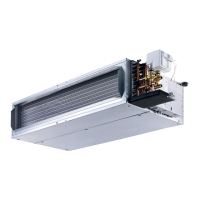4.4.1 - Actuator replacement procedure
The actuators on both the chilled water and the hot water
valves may be replaced if either develops a fault.
• Disconnectthepowersupplytotheunitbeforecarrying
out any work on a unit.
• Disconnecttheactuatorpowersupplycable.
- 230 V type actuator used with the Carrier
numeric controller: Disconnect the actuator
power supply cable tted with a quick connector.
- 230 V actuator used with an electronic
thermostat: Remove the plastic protection cover
held in place with two screws. Disconnect the
actuator power supply cable connected to the
quick connector. This can be done by pressing
down the spring tongue using a screwdriver and
pulling out the wire from the appropriate terminal.
• Uncouplethefaultyactuator.Rettingisbythereversal
of the procedure described above.
WARNING: Ensure that the actuator is rmly screwed to
the valve body (maximum torque 15 N·m).
4.4.2 - Valve body replacement procedure
• Disconnectthepowersupplybeforecarryingoutany
work on a unit.
• Closetheisolatingvalvesonthemanifolds.
• Unscrewtheunionnutstodisconnecttheexiblewater
pipes.
• Removethevalveactuatorstakingcaretoidentifythe
cooling and heating valves.
• Disconnecttheexiblecondensatedrainpipewhichis
held in place by a collar (the collar is not supplied by
Carrier).
• Removethetwo-wayorfour-waywaterowcontrol
valve bodies. Depending how the unit is congured,
the four-way valve coupling may be tted with a
heating/cooling changeover switch, if so do not
remove it.
• Fitthenewvalvebodytothecoil(tnewgaskets).
• Reconnecttheexiblecondensatedrainpipewhichis
held in place by a collar (the collar is not supplied by
Carrier).
• Retthevalveactuatorstakingcaretoensurethat
they are correctly xed to the valve body.
• Reconnecttheexiblewaterpipesbytighteningthe
union nuts. Retighten all the water connections and
ensure that all gaskets have been changed and correctly
tted(maximumtorque15N·m).
• Opentheisolatingvalvesonthemanifoldsandpurge
all air from the system.
• Checkthattherearenoleaksandreconnectthepower
to the unit.
WARNING: When replacing a valve always ensure that
the direction of ow through the valve is as shown by the
arrow on the valve body. If the direction of ow is wrong,
the valve body will deteriorate rapidly and the ow
control will be distorted.
- Optional electric heater
WARNING: Disconnect the power supply before carrying
out any work on the unit.
If the electric heater develops a fault, it must be replaced;
this requires the removal of the fan motor assembly: Fig.12.
CAUTION: Do not touch the live metal heater elements
when the electric heater is connected to the power supply.
Electric heater replacement procedure:
• Removethelter.
• Removethefanmotorassemblyaccesspanel.
• Identifyandnotethefanspeedswiredtotheauto-
transformer terminal block. Disconnect the power
supply cable.
• Removethefanmotorassembly.
NOTE: Be careful not to touch the fan blades during
the removal process to avoid unbalancing the fans.
• Disconnecttheelectricheaterpowersupplycables
and remove them through the cable conduit.
• Unscrewthedefectiveheater(s)andreplaceit(them).
• Replacementofthefanmotorassemblyisbythe
reversal of the above procedure.
Carrier Electronic thermostat type B is embedded with
Electric heater relay 8 Amps. Accordingly, Carrier requires
an additional protection relay for electric heater with
above 1400 W capacity.
Moreover, all units delivered with an electrical box or a
Carrier controller are always equipped with a relay if the
capacity of the electrical heater is above 1400W.
WARNING : In case of customer supplied controller, it is
the responsability of the installer to set up an additional
protection relay corresponding to the electrical heater
capacity.
A water temperature sensor can be provided. It has to be
installed on the water circuit as described below :
• For2-pipecoil:thesensorshallbeinstalledona
cooling water pipe (for change-over function).
• For4-pipecoil:thesensorshallbeinstalledona
heating water pipe (for cold-draft function that
prevents the operation of the unit when the heating
network is off).
NOTE: In case of 2-pipe coil, the sensor is installed on a
part where the water ow is continuous.

